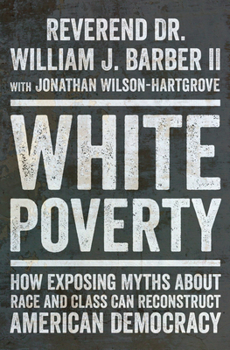White Poverty: How Exposing Myths about Race and Class Can Reconstruct American Democracy
Select Format
Select Condition 
Book Overview
When most Americans think of poverty, they imagine Black faces. As a teenager, Reverend William J. Barber II recalls seeing Black mothers interviewed on television whenever there was a story on food stamps or unemployment; poverty, then as now, was depicted as an essentially Black problem. In a work that promises to have lasting repercussions, Barber--now a leading advocate for the rights of our nation's poor and the "closest person we have to Dr. King" (Cornel West)--addresses white poverty as a hugely neglected subject that might just be the key to mitigating racism and bringing together the tens of millions working-class and impoverished whites with low-income Blacks. Recognizing that angry social media posts have replaced food, education, and housing as a "salve" for the white poor, Barber contends that the millions of America's lowest-income earners have much in common, and together with Jonathan Wilson-Hartgrove, provides one of the most sympathetic and visionary approaches to endemic poverty in decades.





